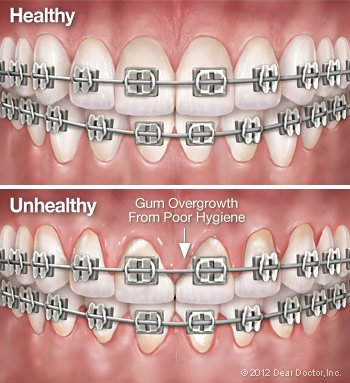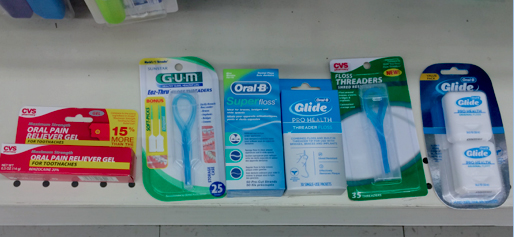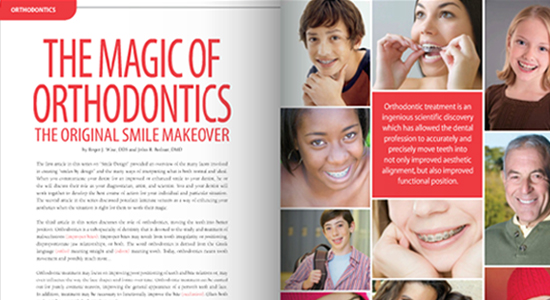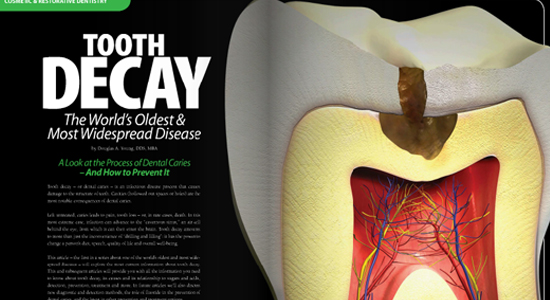


Patient cooperation is a big part of successful orthodontic treatment. Please be sure to wear your appliance as prescribed, including your rubber bands, headgear, retainer or other appliance. If not, your treatment will be delayed and take longer to complete.
Also be sure to take care of your appliances. Avoid the foods listed above. Broken appliances require additional repair appointments and additional fees. Sometimes broken appliances cause unwanted tooth movement, and ultimately, delayed treatment.
We understand that appliances do break – even when you aren’t eating anything listed above! Take care of your appliances, and your treatment should run smoothly!
You already know that maintaining good oral hygiene is important for everyone — but when you’re having orthodontic treatment, it’s even more critical. Why? Because, while the appliances (such as braces or clear aligners) you may need to wear during treatment are very effective in correcting misaligned teeth, they can also trap food particles easily. Keeping your teeth (and your appliances) clean is a little harder — but you can do it! Here’s a look at why good oral hygiene is so important during orthodontic treatment, and some tips on how you can keep it up.
The major enemy of oral health is plaque. Food that becomes trapped near tooth surfaces can lead to the formation of plaque — a thin coating of microorganisms and organic debris (biofilm) containing potentially harmful bacteria. Braces or other appliances make it harder to remove plaque. The bacteria in plaque digest the sugars in food, producing acids which may erode teeth and irritate gums. This can cause cavities, white spots on teeth, gum disease and bad breath.
Keeping plaque under control is one of the most effective means of maintaining strong, healthy teeth and gums. There are three general ways to do it: through diet, daily maintenance, and regular professional care. Taken all together, they’re your teeth’s best defense.

Controlling your diet involves avoiding foods that could increase your risk of developing tooth decay. That means cutting down or eliminating foods with an excess of sugar, like soda, sweets, and ice cream. It also means avoiding foods that could easily become stuck in your braces, like toffee, gum, licorice and caramels.
Foods that are very hard or extremely sticky can also cause physical damage to orthodontic appliances. Certainly braces or retainers with broken wires or loose brackets aren’t working to straighten your teeth! You should avoid foods like hard candies or nuts, beef jerky and hard pizza crust. Keep eating healthy foods like carrots and apples — but cut them into bite-sized pieces first! And don’t chew on ice, pencils, or your nails: these habits can cause damage to your appliances, and even result in chipped teeth!
You know how important brushing and flossing are for keeping a healthy smile — especially now that you’re in orthodontic treatment. But sometimes it’s harder to clean your teeth effectively around an appliance’s brackets and wires. Here are some tools and tips you can try for better tooth cleaning.
Either a soft-bristle or a bi-level toothbrush (one with longer bristles on the edges and shorter ones in the middle) can be effective in plaque removal — even with braces. An electric toothbrush can also be used, on a moderate setting. For hard-to-clean areas, try an interdental brush, or proxabrush. The small bristles of this special tooth-cleaning aid, which is shaped like a pipe cleaner, can get in between wires, brackets and teeth. With gentle and persistent effort, it’s possible to reach into the smallest nooks and crannies, and control plaque buildup.
You should floss at least once a day during orthodontic treatment. While it’s a little harder to do with braces, there are some special products available — including floss threaders and particular kinds of floss — that can help you get the floss between wires and gum line. Our staff will review proper brushing and flossing techniques with you when your braces are put on — but if you ever have questions, don’t hesitate to ask!
Depending on your situation, we may recommend an in-office or at-home supplemental fluoride treatment to boost your cavity resistance. An antiseptic rinse may also be recommended, to ease minor gum inflammation or irritation.
If you have a retainer, it should be brushed daily, the same way you brush your teeth. We may also recommend using a cleaning solution — but never put hot water on your retainer, because it can distort the soft plastic and make it unusable! And always keep it in a case when it’s not in your mouth.
Even though you’re seeing an orthodontist regularly, that doesn’t mean you don’t need to see your regular dentist — in fact, it’s just as important as ever! While we’re focused on improving your bite and alignment, your dentist will make sure your teeth stay healthy with thorough examinations, cleanings and preventive care. Your orthodontic treatment is a team effort where everyone — our office, you, and your family dentist — has an important role to play. And the team has just one goal: giving you a winning smile.
Call our office as soon as possible if you break or loosen any of your appliances. Please do not come directly to the office – by calling us, you will allow us to create a time to see you. Even if you have a regular appointment scheduled, call us immediately to notify us if you need an appliance repaired.
Back to TopCall our office immediately for advice if a bracket or wire is loosened. The bracket may need to be re-fitted as soon as possible. You may have a situation that requires cutting a wire or sliding a bracket off a wire at night or over the weekend. If you need to cut a wire in case of emergency, you may use fingernail clippers that have been washed and sterilized in alcohol. Please call our office the next business day, so that we may schedule an appointment for you.
Back to TopSometimes discomfort caused by a wire on your braces can be resolved by moving the wire away from the irritated area with a cotton swab or eraser. If the wire will not move, try covering the end of it with a small piece of cotton or a small amount of wax. If the wire is painful, you can cut it with nail clippers or scissors that have been washed and sterilized in alcohol. If you cannot resolve the wire irritation, call our office for an appointment.
Back to TopMost patients lose a separator during their treatment. Do not worry about losing a separator, but call our office to see if it needs to be replaced.
Back to TopDuring the first week after your braces are in place and routine adjustments are complete, you will likely feel some pain, soreness or discomfort. You may take acetaminophen or other non-aspirin pain relievers while you adjust to your new braces. A warm wash cloth or heating pad may reduce the soreness in your jaws.
Back to TopFor most situations, common sense will tell you what to avoid. Hard foods, sticky foods and foods high in sugar must be avoided. Hard foods can break or damage wires and brackets. Sticky foods can get caught between brackets and wires. Minimize sugary foods; they cause tooth decay and related problems.
Your local Longs/CVS has what your need! Just go to the toothbrush section and you can stock up on your braces care needs. Here are some of our recommendations:


Proper alignment of the teeth is basic to “Smile Design.” Their position dictates how they work together and affects the way you look and smile. Only orthodontic treatment can move teeth into the right position. Simply put, when things look right, they probably are right.
Learn the basics of smile analysis and design and whether the magic of orthodontics will work for you…
Download Full Article
Tooth decay is the number one reason children and adults lose teeth during their lifetime. Yet many people don’t realize that it is a preventable infection. This article explores the causes of tooth decay, its prevention, and the relationship to bacteria, sugars, and acids…
Download Full ArticleRE: COVID-19 (Coronavirus)
To our valued patients,
In order to prevent the spread of COVID-19 (Coronavirus), President Trump, the American Dental Association and the Hawaii Dental Association are recommending all dentists postpone nonemergency dental procedures for 2 weeks. Our practice is committed to protecting the community and avoiding using valuable resources that our first responders and frontline healthcare providers will need.
Our office will be closed effective today, Wednesday, March 18, and we plan to resume regular hours on Wednesday, April 1. If you are experiencing a true dental emergency including swelling or severe tooth pain, please call your general dentist office, and listen closely as emergency contact info will be available. For all nonemergent questions, please email us at [email protected].
We are so sorry for the burden this places on your schedules, but your continued health and safety are our number one priority. Our office is working diligently to reschedule all patients with existing appointments within the next 2 weeks. We will continue to evaluate the situation as it evolves and determine on a weekly basis when it is appropriate for us to return to normal orthodontic patient care. We ask for your compassion and understanding at this time as we all work together to keep Hawaii healthy.
Sincerely,
Your Morita Orthodontics Ohana